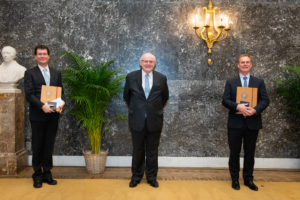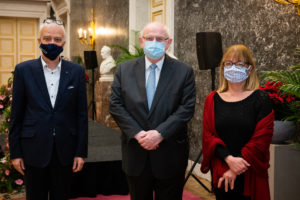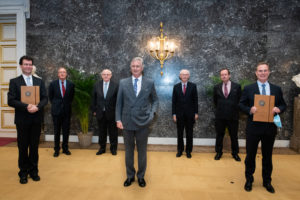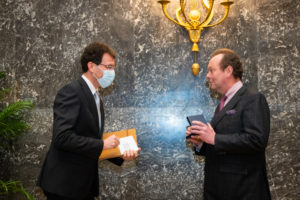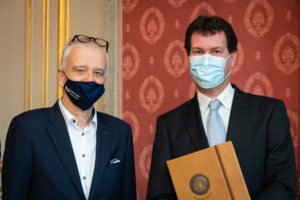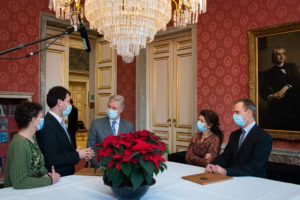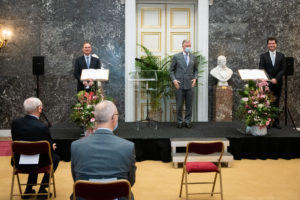2020 Report Bart LOEYS
Ceremony of the Francqui-Collen Prize by his Majesty The King
at the Palais des Académies on December 16, 2020 (without public)
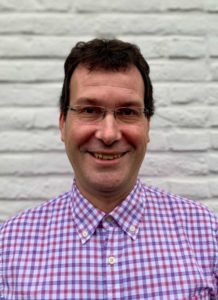
Career – Works – Report of the Jury
Career
Bart Loeys is a full professor in cardiogenomics at the Center for Medical Genetics of the University of Antwerp/Antwerp University Hospital. He is married with Dr Frederike Carton and proud father of four children: Hannah, Elisabeth, Matthias and Lara.
He obtained a medical degree at the Ghent University in 1995 and subsequently started a pediatric residency training at the Ghent University Hospital. During this training program (1998–2002), he combined clinical and research activities and worked as a junior clinical investigator of the Fund for Scientific Research-Flanders in the Center for Medical Genetics of the Ghent University. His research project, entitled “Genotype and phenotype study of inherited defects of the elastic fiber” (promotor: Prof Dr Anne De Paepe), resulted in a PhD-degree of Doctor in Medical Sciences (2004). This training provided him with the strong basis for his future scientific career devoted to the study of connective tissue disorders. From 2002 to 2005, he was accepted in the fellowship program in medical genetics of the Johns Hopkins Medical Institute in Baltimore, USA (director: Prof Dr David Valle). As Belgium did not yet have an official recognition for clinical geneticists at that time, this additional fellowship was key in developing additional skills in clinical and laboratory aspects of genetics. Together with his colleague, Harry Dietz from the Johns Hopkins University in Baltimore USA, he identified a new aortic aneurysmal disorder, now called Loeys-Dietz syndrome. At the end of his fellowship, he successfully obtained the certification for clinical genetics from the American Board of Medical Genetics. Since 2005, upon his return to Belgium, he is a senior clinical investigator of the fund for scientific research – Flanders, initially in the Center for Medical Genetics-Ghent and since December 2010 in the Center for Medical Genetics of the University Hospital in Antwerp (Chair: Prof Dr Geert Mortier). Over the years he became an internationally renowned expert in the genetic basis of aortic aneurysmal disease. He established a new cardiogenetics clinic at the Antwerp University Hospital that closely collaborates with the cardiology department. Professor Loeys’research group currently consists of four senior postdocs and ten PhD students. This team is focusing on the genetic and pathophysiological basis of aortic aneurysmal disease using different disease models as paradigms for the fundamental elucidation of the pathogenesis of aortic disease. He also established a new research line that studies iPSC-cardiomyocytes to unravel the molecular basis of inherited cardiac arrhythmia. Since 2016, eight PhD students have successfully defended their PhD thesis under his guidance at the Faculty of Medicine of the University of Antwerp.
The excellent quality and impact of his research is demonstrated by the fact that he has been awarded an ERC starting grant and an ERC consolidator grant. In 2013, he obtained an ERC starting grant to study the genetic basis of bicuspid aortic valve related aortopathy. In 2018, he acquired an ERC consolidator grant to study the genetic modifiers underlying variable severity of aortopathy in thoracic aortic aneurysmal disease. Over the last 10 years, his research team in Antwerp has identified 8 new genes in aneurysmal disorders (TGFB2, TGFB3, SKI, BGN, SMAD6, TBX20, ROBO4, one unpublished) and 5 new genes in other monogenic conditions (DLL4, SLC25A26, SEC61A1, GFI1B, IBA57). The newly discovered aneurysm genes have consolidated the role of TGFb signaling pathway and lay the strong foundation for his current research efforts. Moreover, by revealing mother nature’s own modifying capabilities in his ongoing research projects, he will try to identify promising new leads to therapeutic strategies.
His international role is further exemplified by his role as coordinator of a prestigious Leducq foundation transatlantic network with six international partners on the mechanistic interrogation of bicuspid aortic valve aortopathy. His expertise is solicited worldwide as evidenced by the numerous invited or plenary lectures at international conferences. He has served on advisory committees for the National Heart Lung Blood Institute of the NIH, USA; the National Marfan Foundation, USA and the Loeys-Dietz Foundation, USA. He was an expert in the evaluation committee of the Imagine institute in Paris. He is the lead or senior author on numerous landmark papers in high impact journals (e.g. New England Journal of Medicine, Nature Genetics, JACC) on the clinical and molecular aspects of aortic aneurysmal disease. He has obtained grant support (more than 10 million euro over the last 10 years) from national (Fund for Scientific Research-Flanders) and international sources (EU-project, FAD; ERC Starting and Consolidator Grant; Horizon 2020; Leducq Foundation; Dutch Heart Foundation; Marfan Foundation). His international recognition is also evidenced by his joined appointment to the Department of Human Genetics of the Radboud University Hospital in Nijmegen, The Netherlands (chair professor Han Brunner), one of the leading human genetics centers in Europe. His aortic clinic in Antwerp recently received the highest honors by an independent audit organized by the European Reference Network, VASCERN of which he is an active member. He is also actively involved in knowledge transfer to the next generations as he was the chair of four editions of cardiogenetics training course organized for the European Society of Human Genetics.
* * *
Works
Aortic aneurysm/dissection is a common phenotype that is responsible for the death of about 1-2% of individuals in industrialized countries. Aortic aneurysms most frequently occur in the infrarenal abdominal aorta (AAA), followed by aneurysms of the ascending thoracic aorta (TAA). If untreated these aneurysms may lead to fatal dissections and ruptures. Both genetic and lifestyle factors contribute to disease pathogenesis. In about 20% of TAA probands a positive family history can be identified, which confirms a strong genetic contribution to the TAA pathogenesis. For a long term, a syndromic form of TAA, Marfan syndrome (MFS) has served as the major paradigm. Following an international expert meeting, Bart Loeys spearheaded the revised Ghent nosology in which aortic root aneurysm and ectopia lentis are cardinal features. In the absence of a family history, the presence of these two manifestations is sufficient for the unequivocal diagnosis of MFS. In the absence of any of these two, the presence of a bonafide FBN1 (causal gene for MFS) mutation or a combination of systemic features is required. For the latter a new scoring system has been designed and validated. In this way, FBN1 testing is not mandatory but useful when available. The new nosology puts more weight on the cardiovascular manifestations of the disease. The new nosology may delay a definitive diagnosis of MFS but decreases the risk of premature or misdiagnosis and facilitates discussion of risk and management guidelines.
Early pathogenetic models for MFS focused upon structural weakness of the tissues imposed by microfibrillar deficiency. However, studies of transgenic MFS mouse models have challenged this model and demonstrated a central role for the upregulation of the TGFβ signaling pathway. This central role of TGFβ in aortic aneurysm formation was confirmed by the identification of mutations in the TGFBR1/2 genes (transforming growth factor beta receptor 1 or 2) as the cause of a new aortic aneurysm syndrome (Loeys-Dietz syndrome, LDS). The main distinguishing features between LDS and MFS include the presence of hypertelorism, cleft palate/bifid uvula and arterial tortuosity/widespread aneurysms. Importantly, the study of the natural history of Loeys-Dietz syndrome demonstrates that LDS patients need earlier surgery than MFS and also require more extensive cardiovascular imaging as the disease is affecting the whole arterial tree, beyond the typical involvement of the aortic root (as seen in MFS). So the identification of the genetic basis clearly changes the clinical management of patients affected by aortic aneurysm and dissection.
Over the past few years, the additional thorough clinical and molecular study of aortic aneurysm patients has led to the identification of new genes (TGFB2, TGFB3, SKI, BGN, SMAD6, TBX20, ROBO4) underlying TAA syndrome. Importantly, the majority of these genes are tightly connected to the TGFβ signalling pathway. Although until recently most studies have focused on canonical TGFβ signaling, there is emerging evidence that non-canonical signaling pathways such as the MAPKs (the mitogen- activated protein kinase) may also play a role in aneurysm development. In the aorta of fibrillin-1 deficient mice it was observed that TGF-β- and angiotensin II type 1 receptor (AT1R)-dependent activation of the extracellular-signal regulated kinases (ERK1 and ERK2) is involved in the pathogenesis of aneurysm, and further evidence for their importance was obtained from the abrogation of pathological aortic root growth after treatment with a specific ERK inhibitor. The role of non-canonical TGFβ signaling pathways was also confirmed in the Tgfb2-haploinsufficient mouse model. As such, the noncanonical TGFb signaling is a prominent driver of aneurysm progression in MFS and LDS, and that ERK and JNK are additive and interchangeable in this process.
Although it is generally accepted that beta-blockers slow down the aortic root enlargement, they do not prevent the need for surgery at a later age. Based on the insights derived from the study in the MFS mouse models, it was hypothesized that an inhibition of the TGFβ signaling might offer a better long-term outcome and this hypothesis was further enforced by the discovery of the plethora of TGFb-related genes (TGFB2/3, SMAD2/3 and TGFBR1/2) underlying Loeys-Dietz syndrome. Proof of principle was obtained by treating MFS mice with TGFβ-neutralizing antibody, which rescued the aortic phenotype. In search for a more easily applicable agent, losartan was pinpointed as a potential agent. Besides the angiotensin II type 1 receptor blocking effect, losartan also has an inhibiting effect of the TGFβ signalling pathway. In a placebo-controlled trial of Marfan mice, losartan had a superior effect compared to atenolol titrated for the same hemodynamic effect. Not only did losartan treated mice show a complete arrest of the aortic growth, but also the histology of elastic fibers in the aortic wall was indistinguishable from wild type mice. After a proof of principle study in humans, a large randomized trial in Marfan patients demonstrated the equal efficacy of this medication compared to high dosis of beta-blocker.
* * *
Report of the Jury (November 19, 2020)
The 2020 Francqui-Collen Prize in Biological and Medical Sciences is awarded to Bart Loeys for his seminal contributions to the understanding, diagnosis and treatment of human genetic diseases affecting large blood vessels.
After obtaining his medical degree in pediatrics as well as a PhD at Ghent University, he performed postdoctoral research with the world-renowned geneticist Prof Harry ‘Hal’ Dietz at the Johns Hopkins University in Baltimore, USA. Upon his return to Belgium (initially at Ghent University, currently at the University of Antwerp), he has rapidly gained prominence in his own right as medical geneticist.
Many patients worldwide are severely affected by diseases, known as aortic aneurysms of the aorta: The wall of the aorta, the major blood vessel that originates directly from the heart, is weakened, leading to ballooning of the vessel (‘aneurysm’) which can ultimately leak and rupture. Up to 1% of deaths in the western world are caused by these aneurysms. In a series of elegant genetic analyses spanning the last 15 years, Dr Loeys has identified the genetic and biochemical basis for a large fraction of these diseases. One of these, first described by Loeys with his Hopkins mentor Prof Harry Dietz, is now termed the Loeys-Dietz Syndrome. Loeys has shown that dysfunction of a central biochemical pathway (known as TGF-beta signaling, which allows communication between cells) leads to aortic aneurysms. The identification of specific mutations responsible for aortic aneurysms has immediate implications for people suffering from familial forms of the disease, which can now be identified in advance and monitored carefully, thus saving many lives. In addition, Dr Loeys’ discoveries suggest promising therapeutic approaches for affected individuals.
Dr Loeys is a clinician-scientist and cardiovascular medical geneticist, demonstrating the tremendous promise of precision medicine for bettering the human condition. His work shows how careful analysis of the molecular basis of disease in individuals can bring about a general understanding of biological principles, and at the same time lead to personalized diagnostics and therapeutics.
Members of the international jury :
Professor Johannes (Hans) Carolus Clevers, MD
Hans Clevers MD PhD (1957) is professor in molecular genetics at Utrecht University. He leads a large research group at the Hubrecht Institute investigating stem cells and cancer. His discovery of the link between Wnt signaling and stem cells, the identification of gut stem cells and the development of organoid technology has led to multiple awards including the Breakthrough Prize in Life Sciences. He is an elected member of science academies in the Netherlands, France, the UK and the USA.
Chairman
and
Professor Emma Allen-Vercoe, PhD
Canada Research Chair
University of Guelph
College of Biological Science, Department of Molecular and Cellular Biology
Ontario, Canada
Professor Carlos Caldas, MD FMedSci
Carlos Caldas is Professor of Cancer Medicine, University of Cambridge, and Head, Breast Cancer Functional Genomics Laboratory, Cancer Research UK Cambridge Institute. He is Fellow of the Academy of the Medical Sciences, Fellow of the European Academy of Cancer Sciences, and EMBO Member. He received the 2016 ESMO Hamilton Fairley Award and holds an ERC Advanced Grant. His research focus is the functional genomics of breast cancer and its biological and clinical implications.
Professor Eelco de Koning, MD, PhD
Eelco de Koning is professor of diabetology at the Leiden University Medical Center and group leader at the Hubrecht Institute in the Netherlands. He heads the diabetes section at the LUMC and is coordinator of the nation-wide clinical islet transplantation program. After obtaining his M.D. he started research into islet biology and pathology at the Diabetes Research Laboratories in Oxford which resulted in a Ph.D. in 1994. He worked at the Joslin Diabetes Center 2004-2005 to focus on islet transplantation and beta cell regeneration. His research is currently focused on human islet cell identity and the generation of insulinproducing cells from stem cells.
Professor Yuval Dor, PhD
The Hebrew University of Jerusalem
Israel
Professor Michel D. Ferrari, MD, PhD, FANA, FRCP
Professor of Neurology
Department of Neurology
Leiden Universitary Medical Center
Leiden, The Netherlands
Michel D. Ferrari, MD, PhD, FANA, FRCP
Professor of Neurology, in particular “Paroxysmal Cerebral Disorders”, at Leiden University Medical Centre, The Netherlands. He is an elected Fellow of the American Neurological Association and the British Royal College of Physicians. He received numerous awards, including the WINKLER Medallion for Excellence in Neurological Research, the HARTMANN MULLER Prize for Biomedical Research (Zurich University), the VICI Innovational Research Personal Incentive Schema Award, the SPINOZA Life Time Achievement Premium, the highest science prize in The Netherlands, and a GRAVITY Award “Brain on a Chip” as part of the “Netherlands Organ on Chip Initiative”
Professor dr. ir. Mike S.M. Jetten
Full Professor and Head of the Department of Microbiology
Radboud University
Nijmegen, The Netherlands
Professor Jürgen Knoblich, PhD
Juergen Knoblich is heading the Institute of Molecular Biotechnology in Vienna. He is a developmental neuroscientist studying human brain development and psychiatric disorders. His group has developed a method for growing human brain tissue in the lab. They can recapitulate human embryonic brain development during the first trimester and analyze the developmental defects leading to neurological disorders.
Professor Charles M. Rice, PhD
Charles M. Rice, PhD, is Head of the Laboratory of Virology and Infectious Disease at the The Rockefeller University. He is a prominent figure in research on members of the Flaviviridae including hepatitis C virus and has co-authored over 500 articles in the field of virology. He is a past President of the American Society for Virology, a Member of the U. S. National Academy of Sciences, and a recipient of the M. W. Beijernick, Dautrebande, Robert Koch, InBev Baillet-Latour prizes, the Lasker-Debakey Clinical Medical Research Award, and the Nobel Prize in Physiology or Medicine.
Professor Flora van Leeuwen, PhD
Head of division of Epidemiology and Psychosocial Research
Netherlands Cancer Institute
Professor of Cancer Epidemiology
Faculty of Medicine, Vrije Universiteit
Amsterdam, The Netherlands
Members
